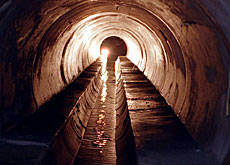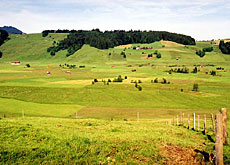Sewage system offers timely relief

Attracted by huge financial savings, foreign countries are looking with interest at a Swiss invention to solve the problem of wastewater treatment in rural areas.
The mini wastewater plant, small enough to fit easily into a cellar, promises to revolutionise how isolated communities far removed from central sewage systems dispose of waste.
The “Aquamin” system, pioneered in Switzerland and currently being tested in the country, separates urine from faeces and produces cleaned water for household use.
“It is completely unique in the world,” says Hansruedi Siegrist of the Swiss Federal Institute for Environmental Science and Technology.
“Naturally the men have to sit down too,” Siegrist adds. “Otherwise the urine cannot be separated.”
Cost savings
Not only is “Aquamin” incredibly cost-efficient, according to its developers, it also has the added benefit of being environmentally sound.
For SFr20,000-30,000 ($17,000-26,000) a mini-plant is available for the home. It offers an alternative to connecting remote properties to central sewage systems, which is laborious and pricey – when possible.
Several eastern European countries have shown a keen interest in the invention. Because it does away with the need to be connected to central sewage systems and large wastewater treatment plants, “Aquamin” represents a viable, thrifty alternative to large public expenditure in country regions.
“There was an inquiry from the Czech Republic, and we will be demonstrating the system at a conference in Poland next year,” says Siegrist.
Family tests
At the moment, “Aquamin” is being “tested” by a family in Switzerland. The pilot project is a venture involving the Swiss government, the Federal Institute of Technology in Zurich, and a private firm.
First, the sewage water is biologically cleaned. Then, it goes into a cleaning basin equipped with a sieve-type membrane that stops bacteria and germs from passing through.
The end result – hygienically clean water – is recycled by the household, in part for flushing toilets and watering the garden, tasks that previously used drinking water. At the Swiss test home, up to 30 per cent less drinking water was used, a significant saving.
Because of the presence of trace elements and the risk of BSE, effluent sludge from central sewage systems is no longer used as fertiliser, but instead must be burned and disposed of at landfills. But in the test house an effluent sludge that can be composted is produced from the faeces.
Potential market – Everywhere
While the developers of “Aquamin” are anticipating a potential market in rural eastern Europe, where many small villages are not yet connected to central sewage systems, Siegrist believes that the project could also bring relief to overburdened sewage systems in densely populated areas. In other words, right at home.
Looking to the future, Siegrist sees mini in-house wastewater treatment facilities supporting and relieving overburdened central sewage systems, which are not only extremely expensive, but are also reaching their limits.
“But it’ll be generations before this happens,” he says. “The lifespan of a central sewage system is about 80 years.”
An at home wastewater treatment facility costs SFr20,000-30,000.
In the Swiss test home a 30% saving in drinking water was achieved through recycling.
On average the Swiss use 162 litres of drinking water per day.
A single-family house in Switzerland has been equipped with its own wastewater treatment plant. It is the only pilot project of its kind in the world.
Anticipated cost savings are significant, as the apparatus eliminates the need to connect to a central sewage system.
Treated water can be stored for later use, important in drier regions.
(Adapted from German by Kathleen Peters)

In compliance with the JTI standards
More: SWI swissinfo.ch certified by the Journalism Trust Initiative










You can find an overview of ongoing debates with our journalists here . Please join us!
If you want to start a conversation about a topic raised in this article or want to report factual errors, email us at english@swissinfo.ch.